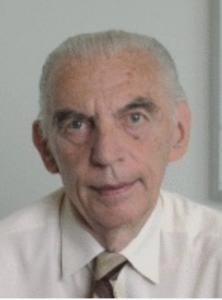Károly Geher
After graduating, he began his teaching career at the Budapest University of Technology (BME) in the Department of Theoretical Electricity headed by Károly Simonyi. In 1957, he moved to the Department of Wired Communications (later known as the Department of Telecommunications and Media Informatics - TMIT), and introduced a new systematization principle and thus a new pedagogical method with his classic subject "Linear Networks".
He developed decades-long relationships with industry and industrial research, primarily with the Telecommunications Research Institute (TKI), where he worked as a part-time senior research associate between 1957 and 1967.
When he finished systematizing classical network theory, he turned to the new challenge of network theory, tolerance analysis. He was the first to focus on this issue in a scientific context worldwide, and he formulated its most essential elements in his textbook. To this day, he is considered the first and most respected "new classic" of the subject worldwide.
He was one of the key figures in the conception and launch of the Mirocoll conference series in Hungary in 1959 (this put Hungary back on the world map of international telecommunications after World War II).
Towards the end of the 1960s, he began to collect and catalog the electronics-related computer programs completed in each year in annual studies (the catalogs were published in the journal Híradástechnika: e.g., issue 6 of 1968; issue 8 of 1969).
His scientific career quickly rose: in 1962 he became a candidate of sciences (with a dissertation on the group running time of microwave systems); based on this he became the holder of the title of Dr. univ. (1963). In 1973 he became a doctor of sciences with a dissertation on the sensitivity of linear networks.
In 1993, the Hungarian Academy of Sciences (MTA) awarded him the Eötvös József Wreath, inviting him to continuously express his opinions on all aspects of technical sciences. He was the chairman of the MTA's Telecommunications Systems Committee between 1984 and 1993, and then continuously served as a member of the Committee.
His excellent research and teaching performance is indicated by several national recognitions: the "Excellent Teacher" award in 1991; the Szent-Györgyi Albert Award in 1998.
He has been a member of the Hungarian Society of Communications and Informatics (HTE) since 1959. He was the chairman of the association's Foreign Affairs Committee, Awards Committee, and Ethics Committee, and until his death he assisted the association's activities as an elected member of the Board.
He served as the first chairman of the Telecommunications Engineering Qualification Committee, established by the 1992 Telecommunications Act, for two terms (1993 - 1999).
He is a Fellow of the Institute of Electrical and Electronics Engineers (IEEE); he was a member, secretary, and then president of the Hungarian National Committee of URSI (Union Radio Science International) (1966 - 1988); among other functions in the international organization of URSI, he was also president of the professional section C (Signals and Systems).
In addition to the above, his other significant awards include: Pollák-Virág Award (HTE, 1961); Tivadar Puskás Award (HTE, 1967 and 1997); HTE Gold Medal (HTE, 1989); 50th Anniversary Award (HTE, 1999). In 1998, he was awarded the Széchenyi Award (Hungarian State) for his versatile and outstanding scientific activities.
- According to his colleagues, he created a new world with his art in teaching the subject of "Linear Networks" for about 40 years. Many, including scientists who have since become recognized, respected him as the father of systematization.
- Since his youth, he has often put his fluent knowledge of German and English to good use.
Created: 2024.06.06. 13:29
Last modified: 2024.07.18. 12:11

